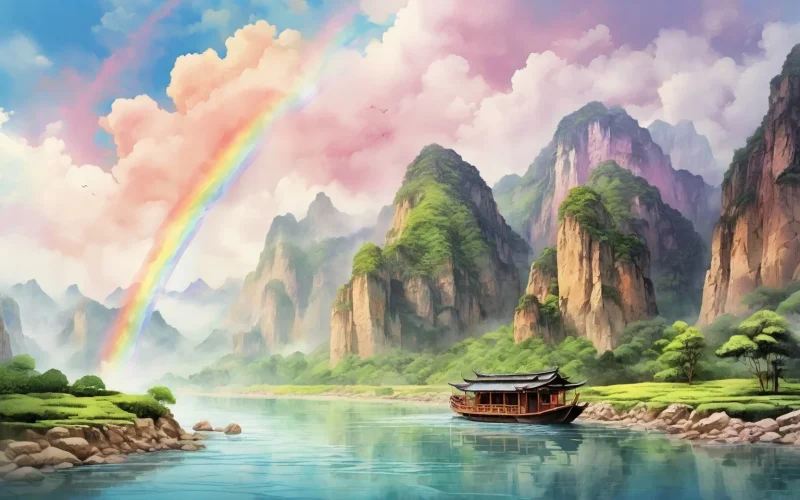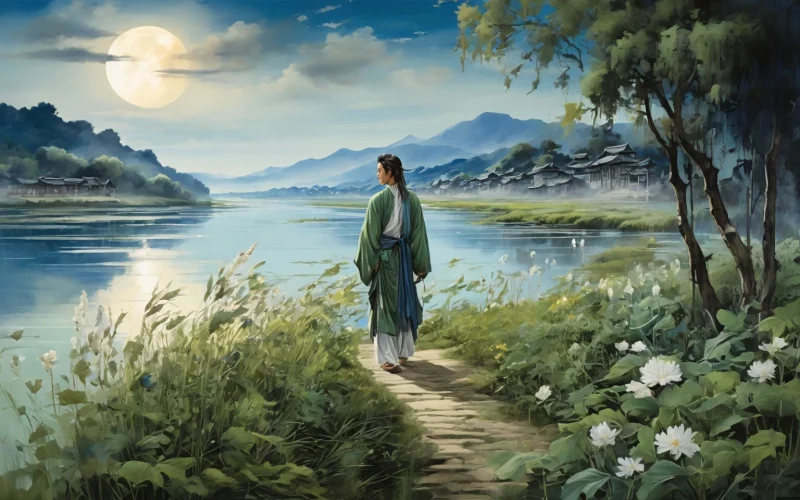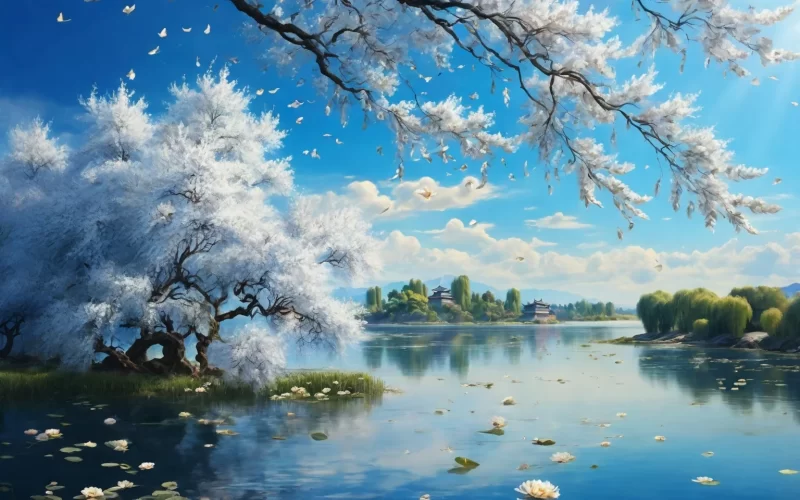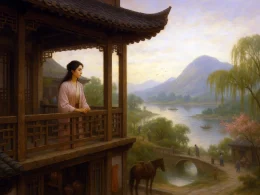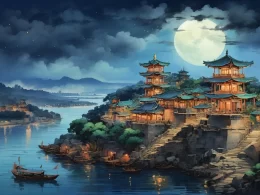Going upstream, I see mountain on mountain high;
The twelve green peaks with Sunny Terrace scrape the sky.
The king in hunting caught by sudden evening shower
Slept there and dreamed of the Goddess in Sunny Bower.
To her charm added the mist-veiled rainbow dress bright;
Away she flew with faded stars and clouds in flight.
However far I stretch my eyes, she can't be found;
Hearing the monkey's wail, in longing tears I'm drowned.
Original Poem
「巫山曲」
孟郊
巴江上峡重复重,阳台碧峭十二峰。
荆王猎时逢暮雨,夜卧高丘梦神女。
轻红流烟湿艳姿,行云飞去明星稀。
目极魂断望不见,猿啼三声泪滴衣。
Interpretation
This poem takes the legend of the Goddess of Wushan as its central theme, blending depictions of the Three Gorges scenery, visions of the goddess, and the emotions of a traveler to create an ethereal and enchanting artistic realm. While sailing through the upper reaches of the Ba River's gorges, the poet is deeply moved by the mountain and river landscapes and mythological tales. Drawing upon ancient accounts of dreaming about the goddess, he skillfully merges reality with legend, presenting both the beauty of nature and profound reflections on life.
First Couplet: "巴江上峡重复重,阳台碧峭十二峰。"
Bā jiāng shàng xiá chóng fù chóng, yáng tái bì qiào shí èr fēng.
"The Ba River enters the gorge with layer upon layer of mountains; Twelve emerald peaks stand steep and precipitous by Balcony Mountain."
The poet begins by pinpointing the location—Wu Gorge—using scenery to compose poetry, sketching a majestic and profound landscape painting that hints at the impending mystical legendary atmosphere.
Second Couplet: "荆王猎时逢暮雨,夜卧高丘梦神女。"
Jīng wáng liè shí féng mù yǔ, yè wò gāo qiū mèng shén nǚ.
"When the King of Chu went hunting, he encountered evening rain; At night he slept on a high hill and dreamed of the goddess."
This adapts the allusion from Song Yu's "Gaotang Fu," making the story of the Chu king dreaming of the goddess resonate interestingly with the "Wushan rain," while also implying the poet's own fantasy of spiritual connection with the goddess.
Third Couplet: "轻红流烟湿艳姿,行云飞去明星稀。"
Qīng hóng liú yān shī yàn zī, xíng yún fēi qù míng xīng xī.
"Pale red flowing mists envelop her moist and gorgeous figure; Transforming into floating clouds, she flies away as the bright stars grow sparse."
The goddess's appearance and departure are dreamlike and illusory. The delicate description reveals an ethereal beauty that combines mystery and tenderness, full of romantic color.
Fourth Couplet: "目极魂断望不见,猿啼三声泪滴衣。"
Mù jí hún duàn wàng bú jiàn, yuán tí sān shēng lèi dī yī.
"Gazing to the extreme with broken heart but seeing her no more; Suddenly hearing three cries of apes, tears wet the clothes."
The dream dissipates, the vision disappears. The poet is immersed in melancholy and emptiness. The ape cries awaken sorrow, concluding the poem with intense desolation and loneliness.
Holistic Appreciation
With dreamlike brushstrokes, the poem depicts the fantasies and sorrows triggered by the poet's passage through Wu Gorge. The image of the goddess in the poem combines both the mysterious romance of the Chu king's dreamt goddess and the illusory fantasy blended with real landscapes, achieving a convergence of poetry and painting, myth and reality, history and personal emotion. The poet seems to relive the Chu king's dream journey to Balcony Mountain in the gorge, projecting his own feelings onto it, making the goddess's dream become the poet's own dream, thereby elevating the poetic meaning.
Artistic Merits
This poem features exquisite conception and natural use of allusions, perfectly combining historical mythology with immediate scenery without being abrupt or affected. The language is concise and elegant, using terms like "pale red," "flowing mists," and "sparse stars" to create a beautiful illusory realm. Structurally, it moves from reality to illusion and back to reality, progressing orderly with deep and moving emotional expression. Particularly, the ending "three cries of apes, tears wet the clothes" adapts a proverb, pushing the emotion to its climax and creating resonance.
Insights
This poem not only showcases ancient literati's sensitivity and romantic imagination regarding mountain and river mythology, but also expresses the loneliness and emotional yearning of travelers. It tells us that truly moving poetry often finds connecting points between reality and illusion, past and present. Only when emotion and imagination combine can they create far-reaching and moving artistic conception. The beauty of the Wushan goddess exists not only in legend, but more in that hopeful yet melancholy place deep in the poet's heart.
Poem translator:
Xu Yuanchong (许渊冲)
About the Poet:
Meng Jiao (孟郊) was born in 751 - 814 AD, a native of Deqing, Zhejiang Province. Meng Jiao's poems include more than 400 poems, most of which are about personal sorrows and loneliness, expressing cynicism, while some of them expose the social phenomenon of disparity between the rich and the poor, and sympathize with the people's suffering.






